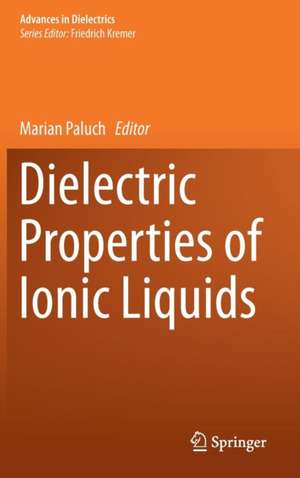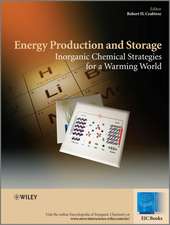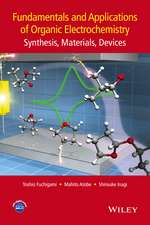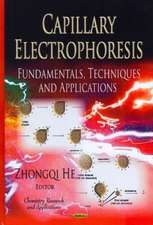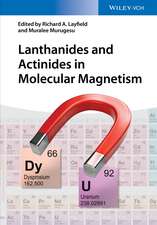Dielectric Properties of Ionic Liquids: Advances in Dielectrics
Editat de Marian Paluchen Limba Engleză Hardback – 30 iun 2016
The book is an excellent introduction for readers who are new to the field of dielectric properties of ionic conductors, and a helpful guide for every scientist who wants to investigate the interplay between molecular structure and dynamics in ionic conductors by means of dielectric spectroscopy.
| Toate formatele și edițiile | Preț | Express |
|---|---|---|
| Paperback (1) | 638.11 lei 43-57 zile | |
| Springer International Publishing – 31 mai 2018 | 638.11 lei 43-57 zile | |
| Hardback (1) | 644.30 lei 43-57 zile | |
| Springer International Publishing – 30 iun 2016 | 644.30 lei 43-57 zile |
Preț: 644.30 lei
Preț vechi: 758.01 lei
-15% Nou
Puncte Express: 966
Preț estimativ în valută:
123.33€ • 134.00$ • 103.66£
123.33€ • 134.00$ • 103.66£
Carte tipărită la comandă
Livrare economică 21 aprilie-05 mai
Preluare comenzi: 021 569.72.76
Specificații
ISBN-13: 9783319324876
ISBN-10: 331932487X
Pagini: 200
Ilustrații: X, 237 p. 116 illus., 58 illus. in color.
Dimensiuni: 155 x 235 x 16 mm
Greutate: 0.53 kg
Ediția:1st ed. 2016
Editura: Springer International Publishing
Colecția Springer
Seria Advances in Dielectrics
Locul publicării:Cham, Switzerland
ISBN-10: 331932487X
Pagini: 200
Ilustrații: X, 237 p. 116 illus., 58 illus. in color.
Dimensiuni: 155 x 235 x 16 mm
Greutate: 0.53 kg
Ediția:1st ed. 2016
Editura: Springer International Publishing
Colecția Springer
Seria Advances in Dielectrics
Locul publicării:Cham, Switzerland
Cuprins
Introduction to Ionic Liquids.- Rotational and translational diffusion in ionic liquids.- Charge transport and glassy dynamics in ionic liquids confined to nanoporous systems.- Electrochemical double layers in ionic liquids investigated by Broadband Dielectric Spectroscopy and other complementary experimental techniques.- Electrical properties of the interface between metals and Ionic Liquids.- Dielectric properties of protic ionic liquids.- Polymerized ionic liquids.
Notă biografică
Marian Paluch studied physics at the University of Silesia in Katowice. In 1998 he gained his Ph.D. with a study on the effect of pressure on the molecular dynamics of glass-forming liquids. In 2004 he completed his habilitation at the University of Silesia and became professor in 2010. He spent two years at the Max Planck Institute for Polymer Research in Mainz in the group of Prof. E. W. Fischer. Later he was appointed as a visiting scientist at the Naval Research Laboratory in Washington DC, the University of Akron, the Hebrew University, the University of Pisa and the University of Tennessee. Marian Paluch is currently the head of the Biophysics and Molecular Physics Department where he is developing high pressure techniques for studying the molecular dynamics in condensed matter, charge transport in ionic liquids, phase transitions and crystallization kinetics.
Textul de pe ultima copertă
This book discusses the mechanisms of electric conductivity in various ionic liquid systems (protic, aprotic as well as polymerized ionic liquids). It hence covers the electric properties of ionic liquids and their macromolecular counterpanes, some of the most promising materials for the development of safe electrolytes in modern electrochemical energy devices such as batteries, super-capacitors, fuel cells and dye-sensitized solar cells. Chapter contributions by the experts in the field discuss important findings obtained using broadband dielectric spectroscopy (BDS) and other complementary techniques. The book is an excellent introduction for readers who are new to the field of dielectric properties of ionic conductors, and a helpful guide for every scientist who wants to investigate the interplay between molecular structure and dynamics in ionic conductors by means of dielectric spectroscopy.
Caracteristici
Discusses mechanisms of electric conductivity in ionic liquids Findings of high relevance for improvement of modern electrochemical energy devices such as batteries, super-capacitors, fuel cells and dye-sensitized solar cells Includes various ionic liquid systems: protic, aprotic and polymerized ionic liquids Includes supplementary material: sn.pub/extras
